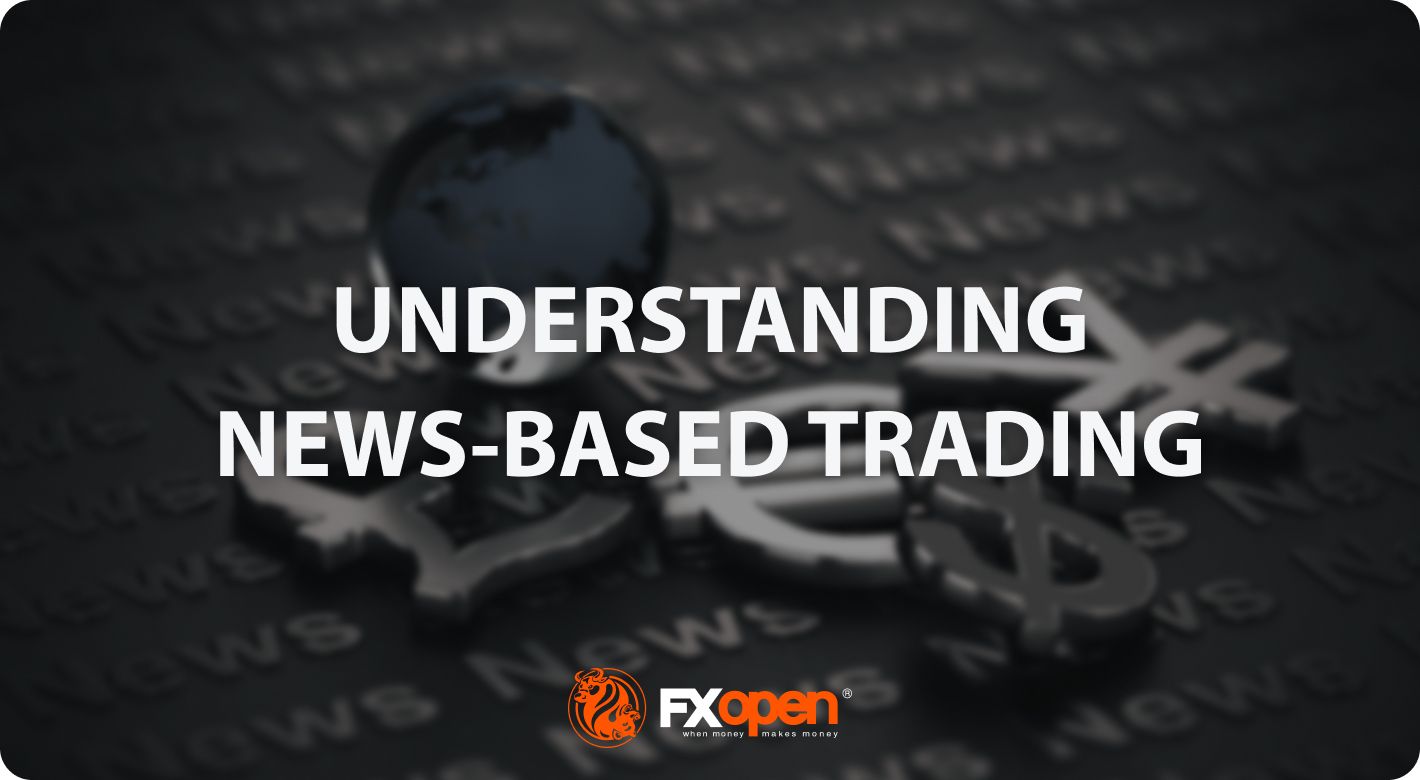FXOpen

News events have a significant impact on financial markets. Every headline — from economic data releases to geopolitical shifts — can determine trading results. If you understand the effect of news on financial markets, you can capitalise on opportunities and manage risk in this dynamic environment. In this article, we’ll share some tips on when and how to trade the news.
What Is News-Based Trading?
As a trader or investor, you need to know when to enter or exit a trade. But you won’t be able to predict future price changes if you ignore the news. Although technical indicators are valuable tools for price prediction, news arrives every day and the market situation changes. To act wisely, you need to know how to react to the news and make investment decisions and trades based on it.
Traders who follow this approach closely monitor economic indicators, market analysis, corporate announcements and geopolitical events to identify trading opportunities. That’s why on various platforms like FXOpen, you can find market news and analysis.
When to Apply a News Trading Strategy
A news trading strategy is usually employed when a significant news event occurs. Here are some common scenarios in which this strategy can be used:
- Scheduled economic releases like a GDP report, employment data, an interest rate change, inflation figures, and retail sales
- Geopolitical events such as elections, trade agreements, political unrest, or natural disasters
- Central banks announce interest rates
- Corporate earnings announcements, mergers, acquisitions, or significant corporate deals if you trade in the stock market
Note that news events can be unpredictable, and market reactions do not always match expectations. Traders should have a well-developed plan, be prepared for volatility, and use appropriate risk management techniques.
If you’re interested in news-based trading, open an FXOpen account and try now. Currently, there’s a lot of news coming in, so it’s a great time to start.
Where to Look for News
To begin, it’s important to identify reliable sources for news and economic data. Check out well-established news outlets and websites that provide comprehensive coverage of global markets. They usually offer real-time news updates, economic indicators, and analysis. Additionally, many trading platforms provide users with their own news, which can be applied easily.
The most popular news sources are:
- BBC News
- Reuters
- Bloomberg
- The Financial Times
- CNBC
Traders widely use an economic calendar to track scheduled economic events. These calendars list upcoming economic releases. They also provide the expected and previous values of each indicator, which helps traders predict future market movements by gauging deviations between previous data or forecasts and actual figures. Economic calendars often categorise events according to their potential impact and volatility, allowing traders to prioritise them.
You may also want to set your personalised news calendar based on your trading preferences. Traders take into account their trading strategies, preferred assets, and markets. It’s possible to customise your calendar to include events and indicators that have a direct impact on the instruments you trade. For example, if you specialise in forex trading, you can include central bank announcements and major economic indicators, including employment, inflation rates, GDP, and retail sales.
Find out more about GDP, central bank interest rates, unemployment rates, and CPI and PMI figures of the country whose currency you want to trade in Forex.
How to Trade the News
It’s important to fully understand how to use a new instrument or technique before starting to use it. Here are some steps you may want to consider when implementing a news trading strategy:
- Define your trading plan — develop a clear trading plan that includes entry and exit points, risk management parameters, and the expected duration of the trade. Determine which financial instruments you’ll trade (currencies, stocks, commodities).
- Categorise events — split news based on economic, geopolitical and company-specific considerations to better understand how influential it is.
- Understand the potential impact — read more about the influence of events on different asset classes. Markets have already gone through many stages, from upsurges to crises. Read expert analyses to see how certain events have affected asset prices earlier.
- Build a news calendar — create a personalised news calendar based on trading preferences and highlight key events and their potential impact on trading instruments.
- Monitor market reactions — as the event unfolds, watch the market reaction. Pay attention to price movements, volume, and changes in market sentiment. If necessary, adapt your trading strategy to new information.
- Manage risk — apply risk management techniques to limit risks that may arise due to news strategy inefficiency. Set stop-loss orders, use appropriate position sizing, and take into account the potential impact of slippage and volatility.
On the TickTrader platform, you can find various instruments that will help you trade based on news. Explore its features and learn more about trading today.
This article represents the opinion of the Companies operating under the FXOpen brand only. It is not to be construed as an offer, solicitation, or recommendation with respect to products and services provided by the Companies operating under the FXOpen brand, nor is it to be considered financial advice.
Stay ahead of the market!
Subscribe now to our mailing list and receive the latest market news and insights delivered directly to your inbox.








